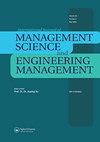A Software Quality Prediction Model for Aspect Oriented System using Neuro-Fuzzy Approach
IF 3
Q2 OPERATIONS RESEARCH & MANAGEMENT SCIENCE
International Journal of Management Science and Engineering Management
Pub Date : 2022-08-11
DOI:10.36647/ijsem/09.08.a008
引用次数: 0
Abstract
Nowadays, the usage of software has increased exponentially in various fields like education systems, industries, health systems, and many others. Various software architectures are already available in the market e.g. modular oriented, component-based, object-oriented, aspect-oriented, etc. Aspect-Oriented (AO) system software has gained much attention due to its superior features to the aforementioned systems. However, AO systems face the challenges of being complex and hard testing environment, a quality assessment of these systems is necessary. In this paper, a software quality estimation model for aspect oriented system using neuro-fuzzy approach has been developed. For which, a detailed study on aspect oriented systems has been accomplished in terms of various attributes affecting the quality of these software. In this paper, a framework of software quality prediction model has been designed using the adaptive neuro-fuzzy inference engine (ANFIS) approach. Data of 200 software pieces have been collected in this study where 150 software data is used to train the ANFIS model whereas 50 software data is used for testing purposes. The quality estimated by the proposed ANFIS model is compared with the actual quality of these software data and quantitative analysis is performed in terms of error measures. Finally, it was found that the proposed ANFIS model worked better in terms of MSE, MRE, MARE, MBRE, and MIBRE error measures.面向方面系统的神经模糊软件质量预测模型
如今,软件的使用在教育系统、工业、卫生系统和许多其他领域呈指数级增长。市场上已经有各种各样的软件架构,例如面向模块的、基于组件的、面向对象的、面向方面的等等。面向方面(AO)系统软件由于其优于上述系统的特性而受到广泛关注。然而,AO系统面临着复杂和困难测试环境的挑战,对这些系统进行质量评估是必要的。本文利用神经模糊方法建立了面向方面系统的软件质量评价模型。为此,本文从影响面向方面系统质量的各种属性入手,对面向方面系统进行了详细的研究。本文采用自适应神经模糊推理机(ANFIS)方法设计了软件质量预测模型框架。本研究收集了200个软件的数据,其中150个软件数据用于训练ANFIS模型,而50个软件数据用于测试目的。将提出的ANFIS模型估计的质量与这些软件数据的实际质量进行了比较,并在误差度量方面进行了定量分析。最后,我们发现所提出的ANFIS模型在MSE、MRE、MARE、MBRE和MIBRE误差度量方面都有较好的效果。
本文章由计算机程序翻译,如有差异,请以英文原文为准。
求助全文
约1分钟内获得全文
求助全文
来源期刊

International Journal of Management Science and Engineering Management
OPERATIONS RESEARCH & MANAGEMENT SCIENCE-
CiteScore
8.50
自引率
33.30%
发文量
40
期刊介绍:
International Journal of Management Science and Engineering Management (IJMSEM) is a peer-reviewed quarterly journal that provides an international forum for researchers and practitioners of management science and engineering management. The journal focuses on identifying problems in the field, and using innovative management theories and new management methods to provide solutions. IJMSEM is committed to providing a platform for researchers and practitioners of management science and engineering management to share experiences and communicate ideas. Articles published in IJMSEM contain fresh information and approaches. They provide key information that will contribute to new scientific inquiries and improve competency, efficiency, and productivity in the field. IJMSEM focuses on the following: 1. identifying Management Science problems in engineering; 2. using management theory and methods to solve above problems innovatively and effectively; 3. developing new management theory and method to the newly emerged management issues in engineering; IJMSEM prefers papers with practical background, clear problem description, understandable physical and mathematical model, physical model with practical significance and theoretical framework, operable algorithm and successful practical applications. IJMSEM also takes into account management papers of original contributions in one or several aspects of these elements.
 求助内容:
求助内容: 应助结果提醒方式:
应助结果提醒方式:


